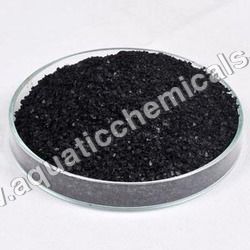Product Description
Leveraging on the support of our dexterous workforce, we have been able to manufacture, supply and trade a wide range of Seaweed Extract Flakes. Eco-friendliness, pathogens resistance, longer shelf life, accurate composition and precise PH value are some of the features of the flakes. Owing to all these features, these flakes are extensively demanded in the industry. Available in different packing sizes, these flakes are processed in accordance with the established parameters of the industry. The Seaweed Extract Flakes offered by us is available at industry leading prices.
Features:
- Causes no harm to soil
- Better chemical stability
- Excellent solubility and highly effective
- Acts as supplement of various nutrients
- Safe to use and known for environment friendliness
- Natural blackish color
Application Area: Agricultural industry, Chemical industry, Cattle feed industry
Specification
|
lginic Acid
|
14%
|
|
Usage
|
Agriculture
|
|
State
|
Flakes also
|
|
Solubility (%)
|
100%
|
|
Odour
|
Fishy
|
|
Ph Balanced
|
Yes
|
|
Total Nitrogen
|
4%
|
|
Quick action
|
Yes
|
|
Perfect fertilizing effects
|
Yes
|
|
Easy to disperse
|
Yes
|
Natural Growth Promoter for Improved YieldsSeaweed Extract Flakes serve as an organic solution for boosting plant vitality and resilience. With a high level of bioactive compounds, these flakes actively enhance both root and shoot proliferation. Their application across diverse crops leads to increased productivity, stronger plants, and greater quality outcomes without environmental harm.
Versatile Application MethodsOur Seaweed Extract Flakes dissolve entirely in water for easy use. They are suitable for foliar sprays, soil applications, and fertigation, offering flexibility to growers. Their quick release ensures plants receive nutrients promptly, making it an efficient choice for both large-scale agriculture and specialized horticulture.
Safe, Eco-Friendly, and StorableWith an organic composition and mild seaweed scent, these flakes are a safe choice for both users and the environment. They should be stored in cool, dry, ventilated spaces away from direct sunlight for optimal longevity, maintaining their effectiveness for up to two years in appropriate packaging like plastic bags, drums, or cartons.
FAQs of Seaweed Extract Flakes:
Q: How should I apply Seaweed Extract Flakes for the best results?
A: Seaweed Extract Flakes can be used as a foliar spray, soil application, or through drip irrigation. Dissolve the flakes completely in water and follow the recommended dosage for your specific crop type to ensure even distribution and optimal absorption.
Q: What are the benefits of using Seaweed Extract Flakes on crops?
A: These flakes stimulate root and shoot growth, enhance resistance to various environmental stresses, and boost overall plant health. Their organic composition also improves soil quality, leading to higher crop yields and better produce quality without chemical residues.
Q: When is the ideal time to apply this product during the crop cycle?
A: Application is most effective during active growth stages, such as seedling development, pre-flowering, and post-stress recovery periods. For perennial crops, early spring and post-harvest are also advantageous timings.
Q: Where can Seaweed Extract Flakes be used in agriculture and horticulture?
A: Seaweed Extract Flakes are suitable for all types of agricultural and horticultural crops, making them versatile for use in open fields, greenhouses, orchards, nurseries, and landscaping projects.
Q: What process should I follow for dissolving and mixing the flakes?
A: Add the flakes to the required volume of water, stirring well until they are fully dissolved. Use the prepared solution promptly to avoid degradation, and ensure equipment is clean and compatible to prevent clogging or uneven application.
Q: How do Seaweed Extract Flakes improve plant resistance to stress?
A: The bioactive compounds in seaweed help plants develop stronger immune responses, making them more resilient to both biotic (pests, diseases) and abiotic (drought, temperature extremes) stresses, supporting consistent growth and yield even under challenging conditions.

